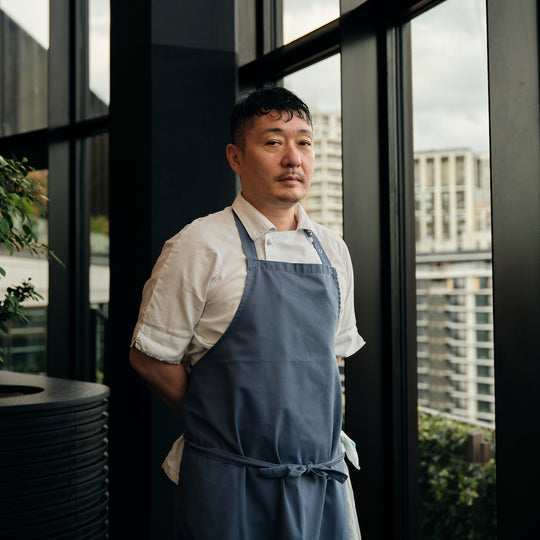HOW TO BUILD A SUSHI MASTER, WITH ENDO KAZUTOSHI
Posted on May 03 2024

For Endo Kazutoshi, the third-generation sushi master and chef whose restaurant – Endo at The Rotunda – has held a Michelin star for five years, a career in cookery was always on the cards.
“It was a kind of destiny”, he told us over coffee in his (beautiful) restaurant. “My grandpa opened a sushi bar in 1940 in Yokohama. I am the first-born son, and first-born sons must take over the family business”.
Endo’s training began young. He credits his mother as his first teacher instilling in him the core values of the restaurant trade. “I wasn’t using knives then”, he says. “But gaining a chef’s mentality around the idea of hospitality and how to treat guests”.
Formal training began under one of Japan’s great sushi masters. It was years before he was allowed to work directly with rice and longer still until he was permitted to prepare the fish. But where many might find this training tedious, for Endo it was an essential part of his future success. “These days chefs might [be working with rice] on their second day. That for me completely doesn’t make sense.”

After years working under his master’s supervision, Endo took the bold step to leave Japan in pursuit of his own creativity and success. "In Japan we have a concept called Shuhari”, he says. “‘Shu' is to follow - I started out following my mother, and my grandmaster. 'Ha' is to keep working this way on myself. 'Ri' is about total innovation."
For Endo, practicing ‘Shuhari’ meant travelling to Spain to learn an entirely different cuisine. Despite having years of culinary and hospitality experience, the move to Spain was not without challenges. “It was shocking”, he says. “I didn’t know anything! It was a total change of environment. But I met a lot of great chefs who explained the culture, the mentality, and the importance of seasonality with fish”.
In addition to learning classics of Spanish culinary cannon, it was in Spain where Endo’s own style – often described as a fusion of tradition and innovation – was developed. And after two years in Spain he felt it was time to apply it in a new context.
He moved to the UK where for several years he ran the kitchen at London’s iconic Zuma. Before setting his sights on opening his own restaurant.

Custom Nakiri Knife in Beech by Katto
The first step was to build a stronger connection with British produce and producers. He travelled to Cornwall to meet small boat fishermen. “That was my first starting point before opening the restaurant”, he says. “You have to understand local fisherman, and what they do. I spoke with them; we lived and worked together. A lot of ideas came from them. For example, with mackerel, they would never eat it raw. It’s been cooked in the same style for maybe 150 years: garlic and butter. That for me was a wonderful example of working together at first but then gaining new inspiration.”
Endo at The Rotunda opened in 2019 and was awarded a Michelin star just six months later. But despite this success, Endo feels he has more to do.
"The Rotunda is already perfect but, you know, unfortunately I'm Japanese”, he says laughing. “It's never good enough."
It’s this relentless mindset which has inspired the restaurant’s recent refurbishment. It will reopen in late Summer and the guest experience promises to be even more extraordinary than before. The brief to Kengo Kuma, the award-winning Japanese architect in charge of re-designing the space, was simple: "I want more calm, a more relaxed place for the guests." But it'll also be more inclusive, with a completely external kitchen enabling visitors to watch every part of the food preparation process.
This connection between chef and guest is one of the most important aspects of the dining experience for Endo, who offers omakase dining as the norm at The Rotunda. "In Japan we have a tradition called sado which is a traditional tea ceremony, and people will always make tea to welcome their guests. It was a detail I learned as a boy to be very important, and I wanted to bring that same environment to the sushi counter - a welcoming to the guests which is all in the details."
His guests are also a vital component of his “golden circle” which connects producer, sushi maker and guest, and from which Endo sources his energy in the kitchen from. “With omakase, the guests and the producers are very important. Then we add skill: connecting to the material, adding detail and so on. But the centre of the circle is that relationship.”
It seems apt, in such an intimate dining experience, that Endo claims his most important kitchen tool to be his hands – after his knives of course. “The knife is an extension of my hand. For me it’s the most important thing. If it’s not sharp enough, you’ll get the same cut but a totally different flavour.” Naturally, we couldn’t agree more…
Keep up with Endo via his Instagram, or book a much sought after table at Endo at The Rotunda when it reopens in September, or his newly opened Kioku. Katto beech handled Nakiris are available to purchase here.
